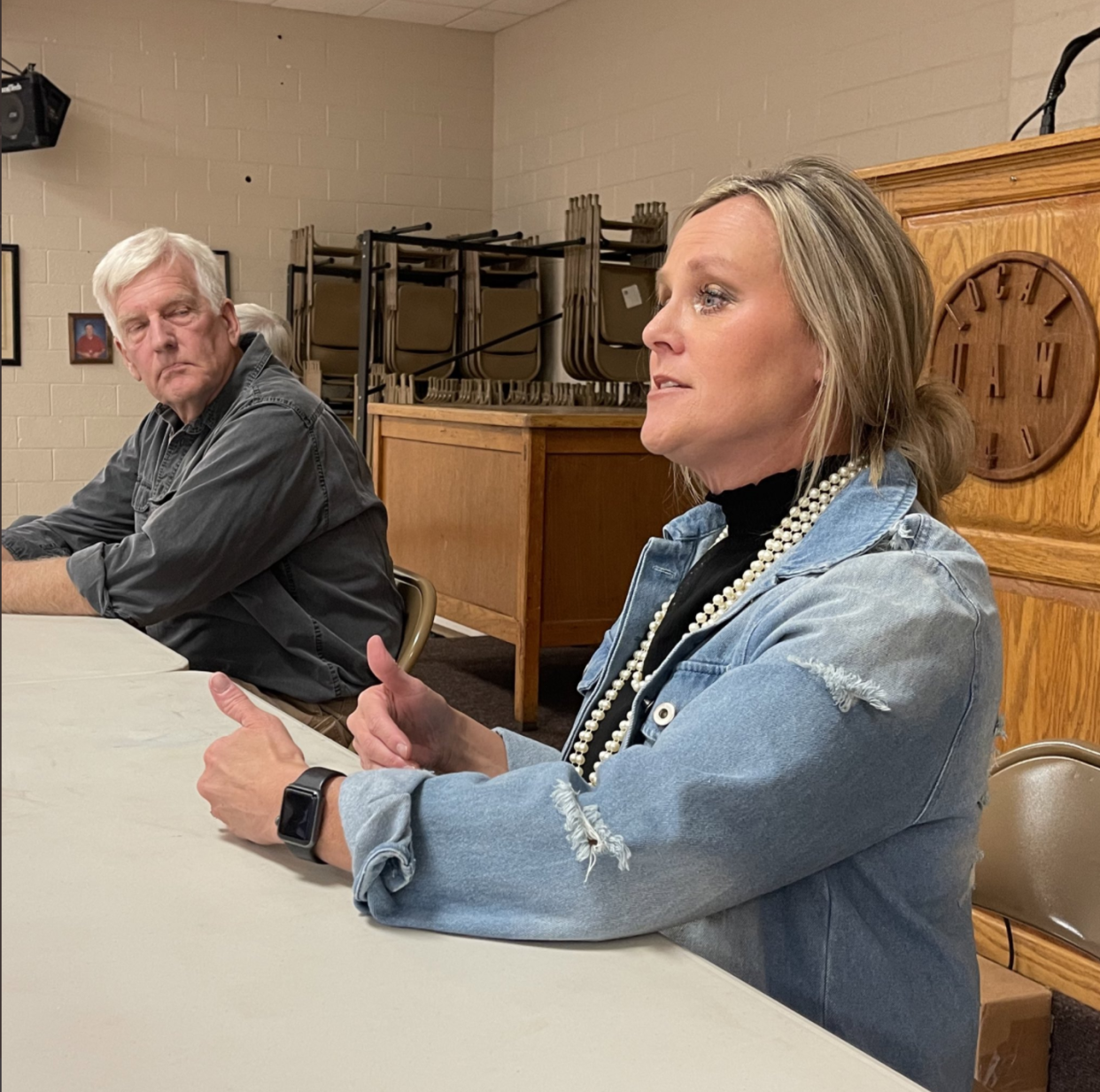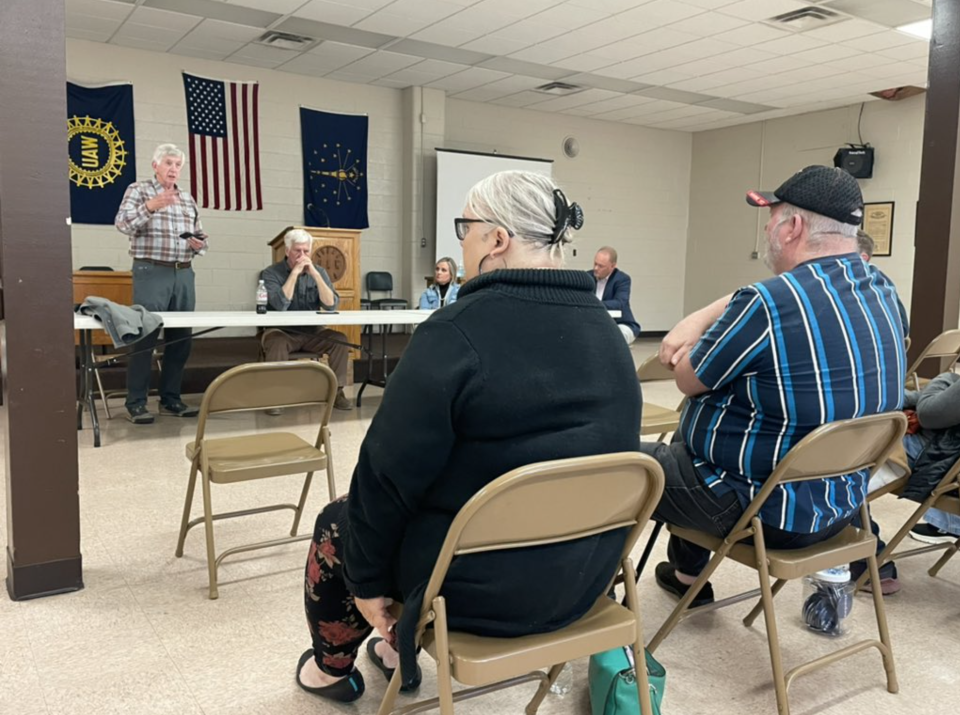Indiana Democrats discuss rural challenges in education, broadband access and more

- Oops!Something went wrong.Please try again later.
BEDFORD — The Indiana Democratic Party hosted an event at Bedford's United Auto Workers union hall on H street Tuesday night. The conversation was open for the public to attend and focused on issues that are affecting rural communities. The conversations featured remarks from former Indiana Superintendent of Public Instruction Jennifer McCormick, State Representative of District 86 Ed DeLaney, and Hoosier farmer Ray McCormick.
The conversation largely focused on the pressing issues facing schools, teachers and students. Other issues that were highlighted include broadband access in rural areas, the Indiana education system, current poverty levels and the importance of sustainable agriculture.
Others are reading: Lawrence County receives share of $101.9M Community Crossing grant funding.
Education
The American Rescue Plan also provided more than $2 billion for Indiana schools to soften the blow of the pandemic. The $1.9 trillion stimulus bill was officially adopted earlier this year on March 11.
Jennifer McCormick discussed the unique hurdles that schools are dealing with. This included criticism of future plans to make school board elections partisan races.
“The school board controversy that’s brought up is being organized nationally, not in Indiana," she said. "We don’t teach Critical Race Theory in K-12 but the Indiana GOP wants that rhetoric to continue. It’s a made-up disruption.”
The tension has been steadily building as public health controversies such as mask-wearing and remote learning, implemented due to the ongoing COVID-19 pandemic, have led to tense school board meetings around the state.
More: Indiana Democrats are campaigning in rural, Republican areas. Will it pay off?
The former Indiana Superintendent of Public Instruction said another issue is how the educational funds are being utilized.
“Twenty-five percent of Indiana's K-12 budget education is unregulated," she said. "We don’t know who is teaching, who is attending, or what they are being taught in these schools. That means it is going to education that we're not really sure about what's happening financially. We're not sure about the quality control there. We're not really sure about who's in those classrooms. There are a lot of uncertainties."

Indiana's K-12 budget constitutes approximately 50% of the state's total budget at around $8 billion annually, according to State Representative Ed DeLaney. DeLaney also serves as a member of the Education Committee.
DeLaney said rural communities face more challenges in securing funding for their schools compared to suburban parts of the state. Property taxes represent one of the ways that public schools are often funded.
A warm heart: Fred Maze, local hairstylist, recalled for generous spirit.
"So your property tax base, the value of the property, is much less than it would be in Carmel, Fort Wayne or Indianapolis for that matter," Delaney said. "So you're restricted on that source."
The state also provides money for schools based on the number of students that are in attendance.
DeLaney said Mitchell is expected to lose 1.5% of its students this year and is projected to lose 2% next year.
"North Lawrence is going to gai 3% one year and lose 2% the next year," DeLaney said. "So you're essentially unchanged. Whereas in Carmel and Fishers, they're flooding with students and we're giving, on average, between $6,000 and $7,000 for students. The state is going to have to say, 'Do we want good schools in small communities or are we going to stick with this system that doesn't recognize your particular problems?' And your problem is stagnant or declining population."
This issue is not only restricted to K-12 education. DeLaney said overall enrollment is declining in state universities and community colleges across the state. College enrollment has reduced by as much as 10% over the last five years. This has prevented Indiana from reaching one of its long-term goals: that 60% of Indiana adults hold either an associate or bachelor's degree. Instead, that current total is 48%.
County news: Jail feasibility study set for review next week.
"I think we have an obligation at the legislature to figure out ways to address this and we have the resources," DeLaney said.
Tuesday night's visit to Bedford is one stop on the Indiana Democratic Party's "Small Town, Indiana” statewide press tour. The tour features 14 stops in various rural communities around the state to build trust and engage in meaningful dialogue.
Agriculture and broadband access
Ray McCormick said Indiana's topsoil has been slowly declining the last decade and highlighted the importance of using cover crops to regenerate soil health across the state.
"In 100 years or 120 years, we've lost about half of our topsoil here in southern Indiana, so we've got to get on the ball and protect our topsoil," he said. "Indiana is a leader in conservation, that's one thing you can be proud of. And that's one thing Democrats do well is advocate for the outdoors, nature, USDA and conservation."
Ray McCormick used his expertise as a farmer to examine the state's soil health and the challenges climate change is bringing with it. He said sequestering carbon is a useful tool in reducing how much carbon stays trapped in the upper atmosphere. If this is done on a large enough scale, he said this will significantly improve the quality of crops, water, air and soil in Indiana and around the country.
Mitchell news: Council approves various ARPA expenditures.
"That's how we're going to save the planet," he said. "There are enough acres out there in Indiana and Iowa and all across the world. There is enough land to put that carbon back into the soil. Then we can grow food from it, we can grow fuel from it, we can grow pollinator habitat. But there's only one place that carbon can go that's up there and that is to put it back in the land."
McCormick has been a farmer for several decades as well as a passionate conservationist. He previously served as president of the Indiana Association of Soil and Water Conservation Districts and serves on the Climate Change Committee of The Nature Conservancy in Indiana.
McCormick emphasized how important broadband services are for farmers so they can continue to keep up with technological advancements. More Indiana-based agriculturalists and farmers have access to broadband services thanks to a $250 million broadband investment that is part of President Biden's American Rescue Plan.
FIlling a need: Stone Belt helping fill worker shortage in Lawrence County.
“Technology is leading in agriculture but if you go back to your office, you may not have good broadband," he said. "Agricultural survives on broadband.”
Jennifer McCormick also praised the broadband expansion.
“This broadband funding from the American Rescue Plan is a gift," she said. "Thank goodness this money came from President Biden. We must spend it wisely and take care of our kids."
This article originally appeared on The Times-Mail: Indiana Democrats visit Bedford to discuss rural challenges

